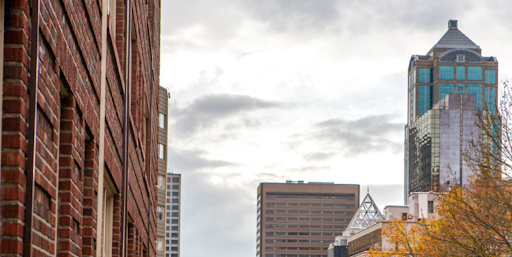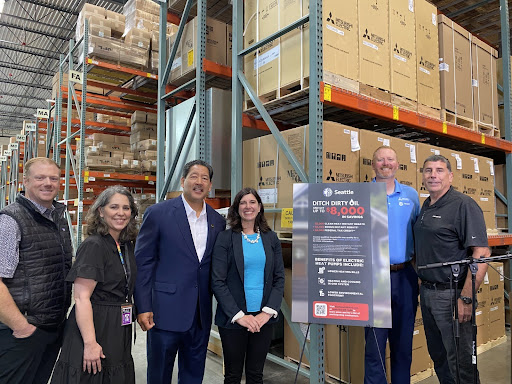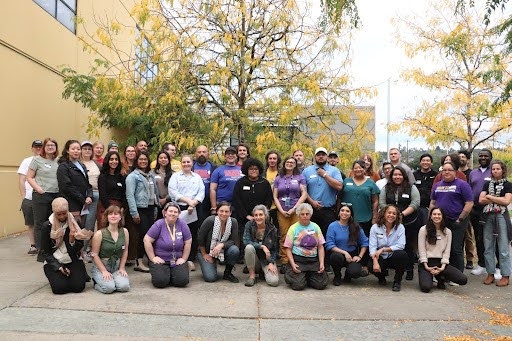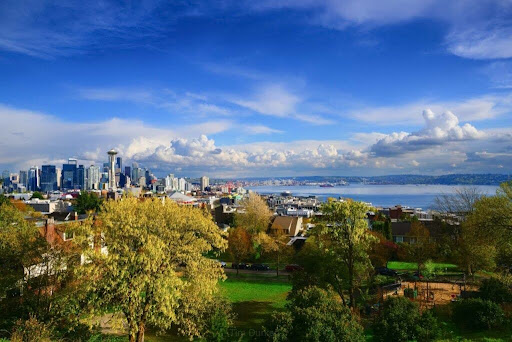Seattle’s Office of Sustainability and Environment (OSE) is celebrating another year of progress toward a more equitable and sustainable City. We’re excited to look back on 2024, from receiving more than $30 million in grants, to releasing the first Food Action Plan update in more than a decade.
Lowering emissions for a cleaner and safer city
OSE recently released the 2022 greenhouse gas emissions inventory, and we’re continuing to track our emissions reduction targets. The report and data visualizations are available on OSE’s website.
Reducing Pollution from Buildings
After Seattle Mayor Bruce Harrell signed the Building Emissions Performance Standard (BEPS) into law last year, OSE got to work implementing it in 2024. Seattle secured millions of dollars in federal funding to help carry out BEPS.
In August, the City received $17.2 million from the U.S. Department of Energy to help buildings in overburdened communities reduce emissions while developing local clean energy jobs. The Federal Emergency Management Agency awarded Seattle $5.5 million to install air conditioning in five public libraries.
The City also put funding directly into Seattle communities. Seattle’s Clean Buildings Accelerator program helps building managers meet State and City emissions standards. The program gave $3.5 million to eight community buildings to help them with costly projects that will reduce greenhouse gas emissions.
Getting Air-Conditioning and Filtration into Homes
Seattle’s Clean Heat program is on track to eliminate oil heating in homes by 2030. This year, we announced bonus Clean Heat rebates (which are still available!), helping moderate-income households save up to $8,000 when switching from oil to a qualified electric heat pump.
Oil heating is expensive and pollutes the air inside and outside. Electric heat pumps help filter air while offering air-conditioning and heating. Roughly 162,500 gallons of oil were avoided in 2024, and more than 250 rebates were distributed to households.
Clean Heat also teamed up with community organization El Centro de la Raza in Beacon Hill to host the first ever Home Electrification Fair! The event featured an induction stove giveaway and local chefs cooking delicious food using electric appliances.
Making Transit More Climate-Friendly and Accessible
In April, OSE released the Transportation Electrification Blueprint (TEB) update on Seattle’s goal to make transit cleaner and safer. The report tracked Seattle’s 2023 progress, including installing electric vehicle chargers and reducing emissions from truck deliveries.
Advancing climate and environmental justice
Empowering Community-led Environmental Justice
This year, we shared that Seattle’s Environmental Justice (EJ) Fund awarded $1 million in total to 17 community organizations for projects that advance climate justice — the most in the history of the program! Learn what the 2023 grantees have achieved in their communities in our storytelling series.
The City’s Duwamish River Opportunity Fund awarded $250,000 to eight projects serving the Duwamish Valley. Seattle’s Duwamish Valley Program made progress combatting environmental justice in the region’s neighborhoods. Nearly 500 youth participated in cleanup events, native tree planting, and art programs hosted by neighborhood organizations.
Creating Green Jobs and Climate Resilience
Seattle’s Green New Deal, led by its Oversight Board, supports a just and equitable transition off fossil fuels by prioritizing climate action in overburdened communities. In the fall, OSE and the Board partnered with MLK Labor and Urban League of Metropolitan Seattle to host five community assemblies. Dozens of union workers and residents collaborated on climate solutions that will inform the Board’s recommendations and the City’s climate planning.
This year, the City invested $2.2 million in the Clean Energy Training and Career Pathways program to train and place workers who have experienced economic and environmental injustices into clean energy jobs in construction, engineering, and more. The program had nearly 150 trainees in 2024.
OSE worked closely with community to help develop the Citywide Resilience Hub Plan, which will be released early next year. An engagement team hosted events to learn what climate resilience looks like for low-income communities of color feeling the impacts of climate change through zine-making, mapping, fun events, and more.
Preserving and Growing Trees in the Emerald City
In 2023, the City received a $12.9 million foresting grant from the USDA to plant and maintain trees where people live, learn, and play. This year, OSE worked closely with fellow City departments to start implementing the grant.
Ensuring everyone has access to healthy, local foods
Reducing Waste and Increasing Food Access
In September, the City of Seattle released the first Food Action Plan update in more than 10 years! Mayor Harrell joined more than 150 community partners to celebrate the update. The Plan will guide City departments over the next five years in combatting food insecurity, high food prices, and waste.
“We are building a City where all communities have access to fresh, affordable, and culturally relevant foods regardless of their race, neighborhood, or income,” Mayor Harrell said.
Making Fruits and Veggies Affordable for All
Earlier this year, Seattle received a nearly $100,000 grant from the U.S. Department of Agriculture (USDA) to help support food trainings, purchasing, and gardening in Seattle Public Schools.
Seattle’s Fresh Bucks Program, which gives participants $40 per month to spend on fruits and vegetables, expanded to new stores in 2024. The program added three local retailers, including its first location in Chinatown-International District. OSE also recently announced that Fresh Bucks is automatically extending benefits through 2025 for residents who use their funds each month!
…
To all our community, business, and City partners — thank you for making 2024 a great year. We couldn’t have done it without you! We look forward to strengthening programs and developing more innovative solutions as a City for a greener, safer, and healthier Seattle in 2025.








